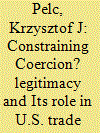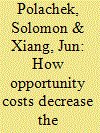|
|
|
Sort Order |
|
|
|
Items / Page
|
|
|
|
|
|
|
| Srl | Item |
| 1 |
ID:
093820


|
|
|
|
|
| Publication |
2010.
|
| Summary/Abstract |
The role of legitimacy in international relations is a topic of much debate, yet there is little understanding of the mechanism behind it. Here I address this discrepancy by asking: are state threats perceived as (il)legitimate more or less likely to be successful? By operationalizing illegitimacy as unilateral action in the presence of a multilateral option, I consider the variation in the success of U.S. trade measures from 1975 to 2000. As I show, the (il)legitimacy of threats modifies the nature of the signal sent by concessions to those threats, and this effect can be measured and predicted. I find that, controlling for material pressure, perceived illegitimacy of U.S. trade threats decreases the likelihood of a target conceding by over 34 percent. Moreover, it pays to resist: targets that resist illegitimate unilateral measures from the United States are 25 percent less likely to encounter similar unilateral measures over the following five years.
|
|
|
|
|
|
|
|
|
|
|
|
|
|
|
|
| 2 |
ID:
093818


|
|
|
|
|
| Publication |
2010.
|
| Summary/Abstract |
A belief in alien abduction is an emotional belief, but so is a belief that Iran intends to build nuclear weapons, that one's country is good, that a sales tax is unjust, or that French decision makers are irresolute. Revolutionary research in the brain sciences has overturned conventional views of the relationship between emotion, rationality, and beliefs. Because rationality depends on emotion, and because cognition and emotion are nearly indistinguishable in the brain, one can view emotion as constituting and strengthening beliefs such as trust, nationalism, justice or credibility. For example, a belief that another's commitment is credible depends on one's selection (and interpretation) of evidence and one's assessment of risk, both of which rely on emotion. Observing that emotion and cognition co-produce beliefs has policy implications: how one fights terrorism changes if one views credibility as an emotional belief.
|
|
|
|
|
|
|
|
|
|
|
|
|
|
|
|
| 3 |
ID:
093822


|
|
|
|
|
| Publication |
2010.
|
| Summary/Abstract |
This article shows that the opportunity costs resulting from economic interdependence decrease the probability of war in an incomplete information game. This result is strongly consistent with existing empirical analyses of the inverse trade-conflict relationship but is the opposite of the conclusion reached by Gartzke, Li, and Boehmer, who reject the opportunity cost argument in a game-theoretic framework. As a result of our findings, one cannot dismiss the opportunity cost argument as the explanation why trading nations fight less. Instead our study reaffirms the central position of opportunity costs as the basis for the inverse trade-conflict relationship, thus implying that one need not rely on signaling.
|
|
|
|
|
|
|
|
|
|
|
|
|
|
|
|
| 4 |
ID:
093819


|
|
|
|
|
| Publication |
2010.
|
| Summary/Abstract |
Studies of terrorism in general and suicide terrorism in particular tend to view terrorist groups independently. However, what if the propensity for a terrorist group to adopt suicide tactics depends in part on its external linkages and the relationship between the organizational capabilities required to adopt the innovation and the organizational capabilities of the group? This article shows that the organizational change requirements for adopting an innovation significantly influence the overall adoption pattern, along with interlinkages between groups. Additionally, evaluating the universe of terrorist groups, not only those groups that adopted suicide terrorism but those that did not, shows that Pape's key variable of interest, occupation, does not significantly predict the adoption of suicide terrorism. Thinking about suicide terrorism as a special case of diffusion in the military area-an innovation for nonstate groups-can help bring the study of suicide terrorism further into the mainstream and highlight how the phenomenon has not just differences, but similarities, to other innovations.
|
|
|
|
|
|
|
|
|
|
|
|
|
|
|
|
| 5 |
ID:
093821


|
|
|
|
|
| Publication |
2010.
|
| Summary/Abstract |
Contrary to the general trend of trade liberalization, specific goods-such as small arms, drugs, and antiquities-have come under increasing international control in recent decades through a set of international regulatory agreements. This article offers a theoretical framework of government preferences on the international regulation of these goods. Departing from conventional models of trade policy, the theoretical framework introduces negative externalities, rather than protection, as the motivation for restricting trade; it also takes moral concerns into account. I test this framework empirically through an original survey of government views on international small-arms regulation. Based on interviewing officials from 118 countries, the survey reveals a large variation in government preferences that conforms to the theoretical expectations. I employ this variation to explain why the international regulation of small arms is weak, despite the fact that these are the deadliest weapons of all in terms of actual death toll.
|
|
|
|
|
|
|
|
|
|
|
|
|
|
|
|
|
|
|
|
|